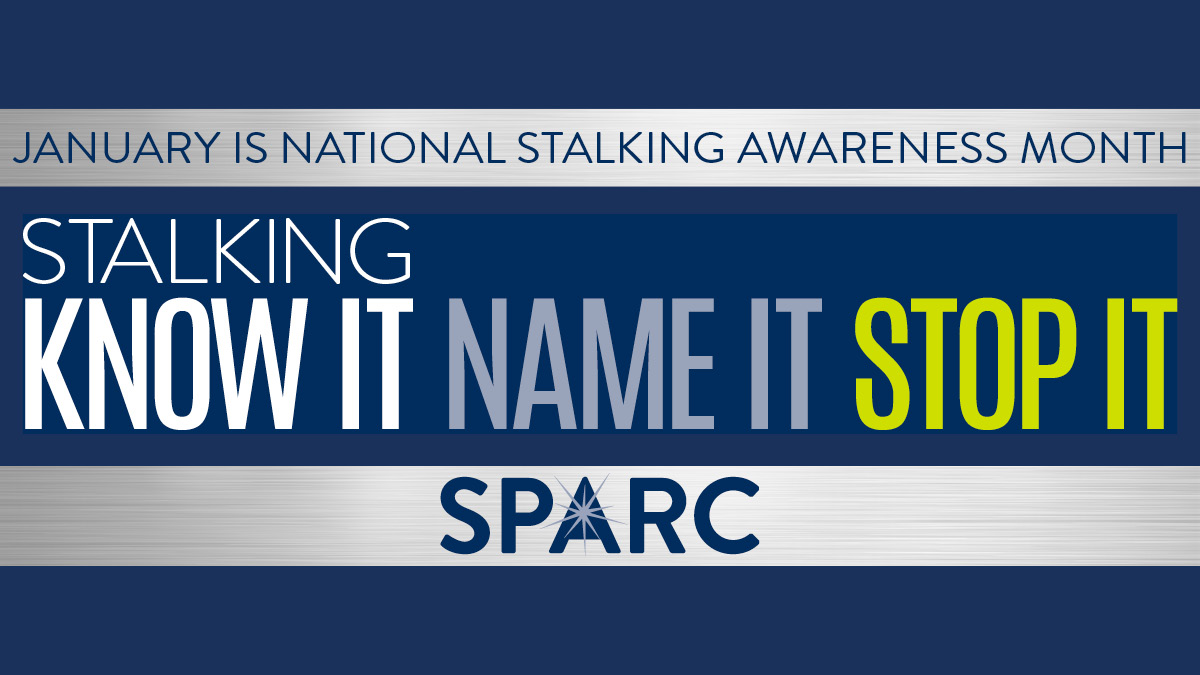
January is National Stalking Awareness Month
If you need help: Call Community Resource Center’s 24/7 Domestic Violence Hotline: 1-877-633-1112. If you are in danger, call 911.
Information from this page is sourced from The Stalking, Prevention, Awareness and Resource Center. For more information and resources, visit stalkingawareness.org.
Stalking impacts 1 in 6 women and 1 in 17 men. Stalking is a pattern of behavior directed at a specific person that would cause a reasonable person to feel fear.
There is a real and frighteningly significant connection between stalking and intimate partner violence. In fact, intimate partner stalking is the largest category of all stalking cases. Stalking often co-occurs with intimate partner violence and can be an indicator of other forms of violence. Many abusers use stalking to intimidate and control their victims. (Stalking Prevention, Awareness and Resource Center)
DID YOU KNOW?
- The majority of stalking victims are stalked by someone they know. Many victims are stalked by a current or former intimate partner, or by an acquaintance.
- 81% of women who were stalked by a current or former husband or cohabitating partner were also physically assaulted by that partner.
- 31% of women stalked by an intimate partner were also sexually assaulted.
- 46% of victims experienced one or more violent incidents by their stalker.
TIME OF GREATEST RISK FOR VIOLENCE
Any stalking case can escalate into violence. The risk of violence is heightened when the stalker:
- Issues direct threats of violence;
- Expresses jealousy of the victim’s relationships with others during the relationship; and
- Uses illegal drugs
IF YOU ARE IN DANGER
If you are are worried that you are in immediate danger, please call 911!
People who stalk can be very dangerous. Stalkers can threaten, attack, sexually assault, or even kill their victims. Unfortunately, there is no single psychological or behavioral profile that can predict what stalkers will do. Stalkers’ behaviors can escalate from more indirect ways of making contact (i.e. like phone calls or texts) to more direct contact (i.e.delivering gifts or showing up where you are at).
While victims cannot control the stalking behavior, they should feel empowered to take steps to keep themselves, their families, and their loved ones safe.
Tips to Consider:
- Trust your instincts. Victims of stalking often feel pressured by friends or family to downplay the stalker’s behavior, but stalking poses a real threat of harm. Your safety is paramount.
- Call the police if you feel you are in any immediate danger. Explain why the stalker’s actions are causing you fear.
- Keep a record or log of each contact with the stalker. You can use this log as an example. Be sure to also document any police reports.
- Stalkers often use technology to contact their victims. Save all emails, text messages, photos, and postings on social networking sites as evidence of the stalking behavior. You may also want to consider how to use your technology and your devices in a safer manner. For more information, please visit the National Network to End Domestic Violence Safety Net Project’s Tech Safety Site.
- Call CRC’s Domestic Violence Hotline (1-877-633-1112) for assistance in exploring your options as well as discuss safety planning.
For additional assistance, you can contact the following hotlines:
Victim Connect: 1-855-4VICTIM (1-855-484-2846)
National Domestic Violence Hotline: 1−800−799−7233 or TTY 1−800−787−3224 En Español
The National Sexual Assault Hotline: 1-800-656-HOPE (4673)
More Resources:
Stalking Awareness – Frequently Asked Questions
Stalking and Intimate Partner Violence – Fact Sheet
Stalking for Love – A video about the popular media trope where invasive stalker-like behavior is presented as an endearing or harmless part of romantic courtship. The hero will often go to extraordinary lengths to coerce, trick or otherwise manipulate his way into a woman’s life.
If you or someone you know needs help: Call Community Resource Center’s 24/7 Domestic Violence Hotline: 1-877-633-1112. If you are in danger, call 911.
Make a Donation
Give today to help families and individuals in crisis receive shelter, counseling, child therapy, legal assistance and resources to break the cycle of violence.
[helpme_button style=”three-dimension” size=”large” bg_color=”#00A8A1″ txt_color=”#fff” outline_skin=”#444444″ outline_hover_skin=”#fff” icon=”theme-icon-video” url=”https://crcncc.org/domestic-violence-program/” target=”_blank” align=”left” id=”Button ID” margin_bottom=”15″]Learn more about our Domestic Violence Program[/helpme_button]

